Denim, pt III: Brand Profiles
Posted by Alex R. on Oct 23rd 2015
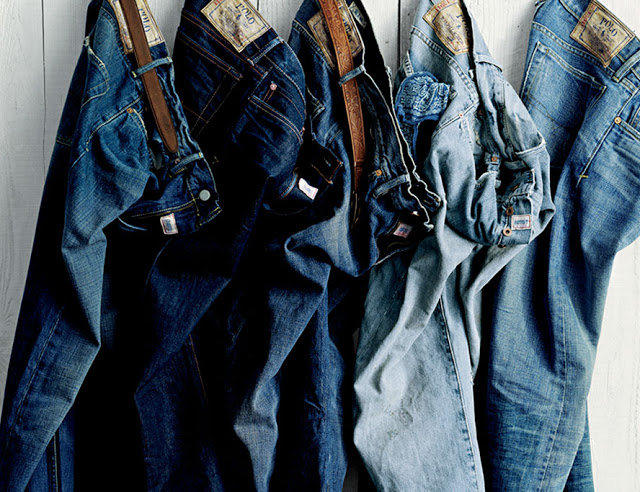
Written by Alex R., Men’s Fashion
In this third and final installment, we’ll synthesize everything we’ve covered so far into profiles of a few of the world’s foremost denim producers. After all, what good is all your denim expertise if it doesn’t manifest into something you can actually wear?
I’ll be breaking down the brands we carry by telling you about the brand, their fits offered, what kind of fabric they use, from where they source their denim, and what they do best.
Levi’s.
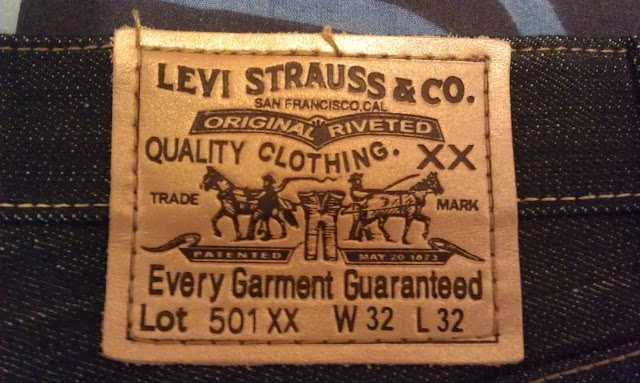
The brand that started it all. In 1870’s California, Levi Strauss created reinforced overalls of indigo-dyed cotton denim cloth after customers of his dry goods store complained of constantly buying cloth to reinforce torn pants. The 501 would not see the light of day until the 1890’s (contrary to a Levi’s ad campaign claiming Strauss sold his first pairs to Gold Rush-era miners), and it wasn’t until the post-war 1950’s that Levi’s truly became a household name.
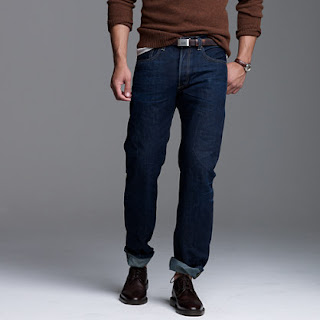
Fits: 511 (Slim), 508 (Tapered), 514 (Straight), 501 (Original Straight – see below), 505 (Regular – a midpoint between Straight and Relaxed), 559 (Relaxed).
Fabric: Levi’s jeans are made exclusively of washed denimwith one single exception: the 501 Original jean is made of unsanforized (not pre-shrunk) raw denim, and features the raw denim-standard button fly as a result. 501’s are the classic “shrink in the bathtub” jean from day’s past, and at $47, they’re a bargain at twice the price.
Source: The Levi’s main line uses denim sourced primarily sourced from the countries where the jeans are produced, namely Peru, Mexico, or Egypt.
What they do best: carry every fit imaginable, in any color you could ever want, at an attractive enough price point that you can buy a few varied pairs to round out your wardrobe and still pay rent.
Levi’s Commuter.
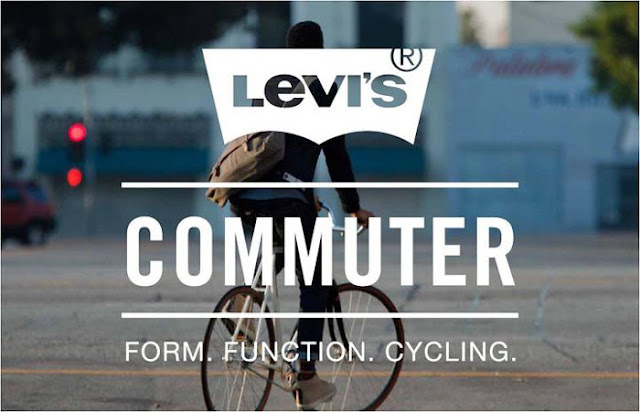
An offshoot of the brand that started it all, engineered for anyone who wears jeans in motion. The “Commuter” moniker comes from the line’s cycling-centric design philosophy. The Levi’s Commuters line produces jeans from highly-technical cotton blends meant to resist water, prevent odor, and move every bit as well as you can. Plus, the blended fabric is more breathable than regular cotton denim and provides a frugal alternative to buying separate “summer weight” denim that is null once winter returns. This technology package is shaped into stylish, familiar cuts like the 511 Slim and 504 Straight to offer a great blend of form and function at a characteristically Levi’s price point. If you wear jeans year-round, you want Levi’s Commuters. If you bike to class, you really want Levi’s Commuters.
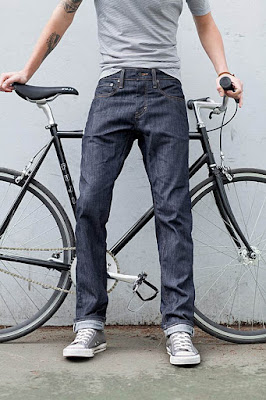
Fits: 511 (Slim), 504 (Straight)
Fabric: Washed denim, but made of a twill/cotton/synthetic blend coated with a water-resistant nanosphere treatment.
Source: The Levi’s commuter line is made in Colombia, and likely uses denim sourced from either there or a neighboring South American country.
What they do best: Technical apparel/fashion crossover designed for active customers. When your jeans are designed to move, that game of pickup Frisbee you see forming after class is suddenly doable. Sure, your Ozonic pants feature 4-way stretch and keep you just as dry – but Levi’s Commuters do all that and look good. A Herculean task, but it’s one Levi’s Commuter line handles just fine.
Adriano Goldschmied (AG)

The personal brand of “the Godfather of Denim” himself, Adriano Goldschmied. Adriano Goldschmied is responsible for the worldwide upscaling of denim past a simple utilitarian pant, and has been a leading innovator in the fashion industry for almost 50 years. Goldschmied still oversees the production of every pair of jeans the label creates, and even owns his own private laundry to ensure each pair is made to his exacting standards.
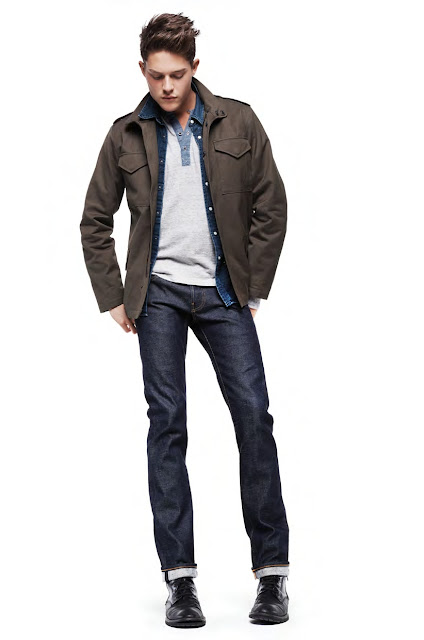
Fits: Matchbox (Slim), Graduate (Tapered), Protégé (Straight), New Hero (Relaxed)
Fabric: Due to the meticulously designed nature of AG’s washes, AG uses washed denim.
Source: AG is notoriously difficult about revealing their exact source – the tags only read “made from imported denim”. Considering every pair is hand stitched in California, that leaves… exactly 204 Olympic-recognized nations left. Guess well!
What they do best: stylish, high-quality washed denim with designer flair and innovative materials. Most AG jeans have been washed to the point of buttery comfort, yet retain durability due to their complex cotton-spandex blends and weaves – oh yeah, and they look great.
7 for All Mankind (“Seven”)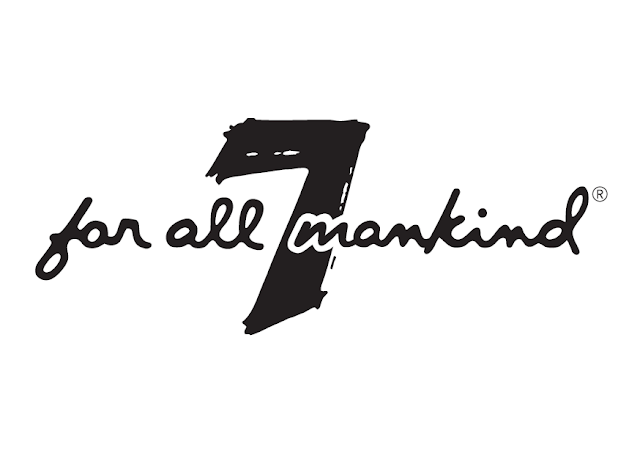
7 for All Mankind was founded in Los Angeles, California, in the year 2000. “Sevens”, as they are known to their fans, quickly gained popularity as one of the first “premium denim” brands to emerge on the scene. This positioned Seven well for the designer denim craze of the mid-2000’s, and catapulted their distinctive “squiggle” pocket embroidery and famous low-rise skinny jean to worldwide acclaim.
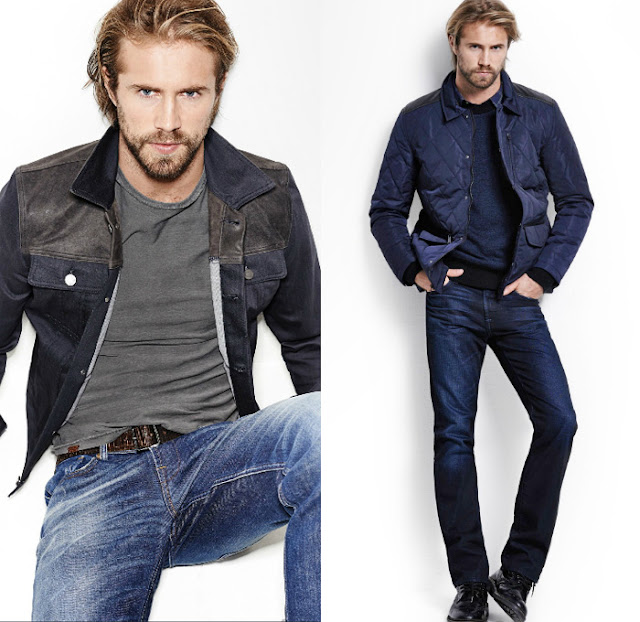
Fits: Slimmy (Slim), Standard (Straight), Carsen (Easy Straight – think Levi’s Regular fit), Austyn (Relaxed)
Fabric: Washed, same reason as AG.
Source: Japanese denim. That’s a very good thing.
What they do best: a similar package to AG, but with more name recognition and a true “Made in USA” story all the way through.
Citizens of Humanity (CoH)
![]()
Think of Citizens of Humanity as the Justice League of the “designer denim” world. CoH was founded in 2003 by Jerome Dahan, one of the co-founders of 7 for All Mankind. In 2007, he convinced long-time friend and denim legend Adriano Goldschmied to join the brand and provide CoH’s laundering services through Goldschmied’s world-famous GOLDSIGN facility. Citizen’s current Men’s Creative Director, Simon Miller, is another storied name in the denim industry. How’s that for star power? “Citizens” plural, indeed.
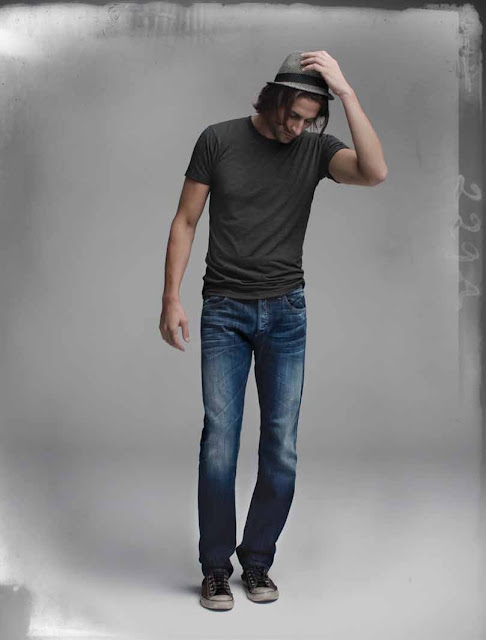
Fits: Core (Slim), Sid (Straight), Perfect (Easy Straight), Evans (Relaxed)
Fabric: Majority washed denim, for the same reasons as AG and Seven.
Source: Japanese denim on some styles; nebulously “imported” on others.
What they do best: washed designer denim with a decidedly wholesome, youthful, Western aesthetic, as opposed to the luxurious AG and the flashy, celebrity-driven Seven. For example: the brand publishes a biannual photography magazine called “Humanity”, highlighting the work of photo essayists who have inspired recent collections. That about sums it up.
Unbranded.
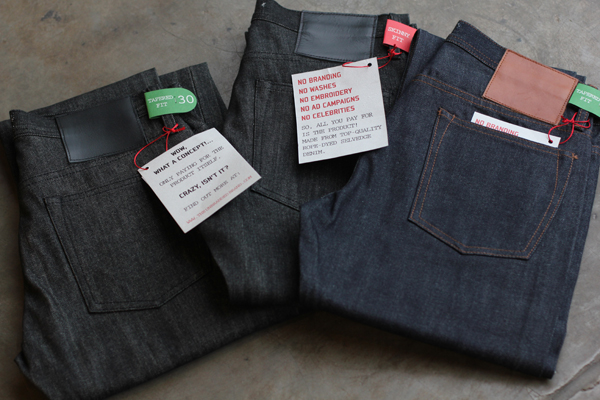
Unbranded started in 2009 as an experiment by Montreal-based Naked and Famous, one of the world leaders in the raw denim market. The thinking behind Unbranded is simple: how cheap could we make premium denim if we didn’t sell an image? Unbranded relies on word-of-mouth marketing, has never produced a single ad or campaign, and sells only raw denim jeans, eliminating the need for the costly and labor-intensive washing process. As the name implies, they don’t even have a logo. Your dollar is converted entirely into product. Bang for your buck goes nuclear.
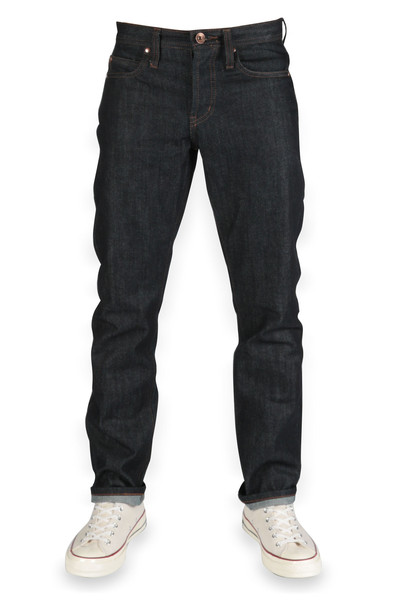
Fits: UB1xx (Slim), UB2xx (Tapered), UB3xx (Straight)
Fabric: All raw selvedge denim. Ding-ding.
Source: 100% Japanese denim across the line. Dingdingdingdingding.
What they do best: Japanese-sourced raw selvedge denim at a price that keeps you off ramen noodles. Unbranded’s UBx01 series of jeans also make great winter-weather jeans for anyone feeling the chill through their other thinner pairs – 14.5oz cotton denim doesn’t let cold in easy. For anyone who’s ever been interested in raw denim, Unbranded is your gateway drug.
There you go, gentlemen and gentlemen: your comprehensive guide to everything denim. I hope you put your newfound knowledge to good use and find your new favorite pair of jeans!
Questions? Concerns? Just want to talk shop? Leave a comment or stop into the store – we’ll be more than happy to spend some time.
